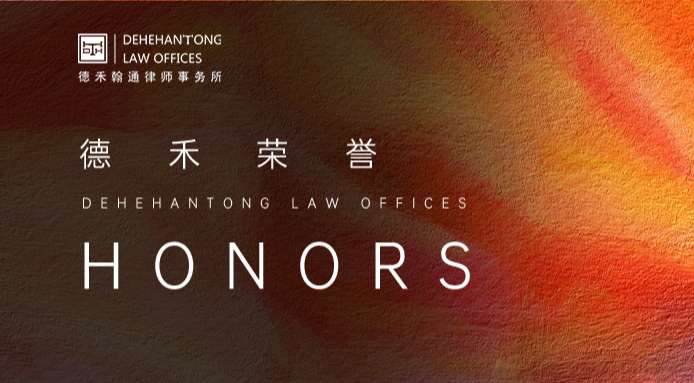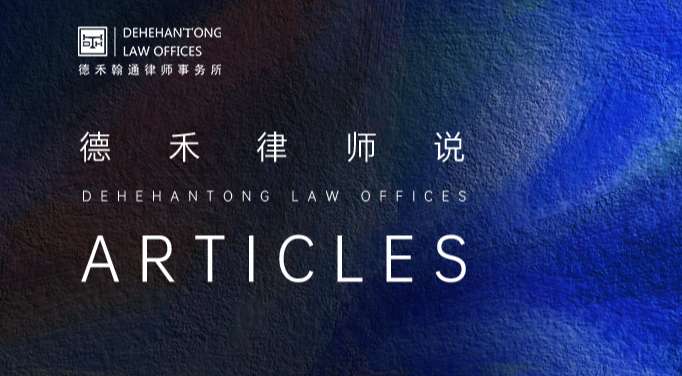Dehehantong successfully represented a criminal case involving a fraud of 3 million yuan - the police lawfully withdrew the case on the grounds of "no criminal facts"
Recently, lawyers Li Lijie and Wang Qian from Dehehantong Shanghai Office successfully represented a criminal case involving a fraud of 3 million yuan - the police lawfully withdrew the case on the grounds of "no criminal facts". From November 12, 2022 to July 18, 2025, after 980 days of unremitting efforts by two attorneys, this criminal case, which was identified by the public security authorities as a fraud of 3 million yuan, was ultimately dropped on the grounds of "no criminal facts". Mr. C, the party involved in this case, not only avoided imprisonment but also left no criminal record. This is fortunate for a family of four. For the two attorneys, this outcome is even more a reflection of their decades of experience in handling cases.
01. Case details
Mr. C, the party involved in this case, established a financial services company in Shanghai. In 2021, he was entrusted to provide company liquidation services for Company A in Shanghai. During the service period, Mr. C falsely claimed to know a certain tax officer, a certain deputy director and the director of the inspection office of the tax bureau, and asked the legal representative of Company A, T, to provide him with money, claiming that the money was used to "smooth relationships", eliminate tax risks and abnormal situations, and dissolve the company. In fact, all the money was transferred to Mr. C's personal account and used for the company's operation and his personal daily expenses.
After investigation, it was found that during January and February 2022, Mr. C repeatedly demanded money from the actual controller of Company A in this way, totaling 3.07 million yuan. During this period, the accountant of its finance company, in accordance with the normal procedures, helped Company A eliminate tax risks, handle the cancellation business, submit relevant materials and pay taxes.
In the middle of 2022, the person involved, T, was detained in another case, and the services provided by Mr. C to Company A were forced to come to a standstill. At the same time, in order to strive for a lighter or mitigated punishment for meritorious service, T voluntarily exposed that Mr. C, the party involved in this case, had defrauded him of over 3 million yuan under the pretext of bribing relevant personnel from the tax bureau and the inspection office to help him dissolve Company A. The public security authorities then initiated an investigation into the case and detained Mr. C on November 12, 2022. Mr. C's wife, after extensive inquiries, found lawyers Li Lijie and Wang Qian from Dehehantong Shanghai Office.
02. Difficulties in the case
This case seems to have a relatively clear plot. From the perspective of the public security authorities, the statements of the "victim", the bank transfer records, and the testimonies of the three witnesses from the tax bureau and the inspection office jointly prove that Mr. C's actions meet the standard elements of fraud, namely:
The perpetrator fabricates facts + the victim disposes of the property due to a mistaken perception + the perpetrator actually possesses the property + the victim's property has suffered losses.
According to T's confession, Mr. C falsely claimed to know relevant personnel from the tax bureau and obtained money from T with fabricated facts. He did not use the money for the agreed purpose but diverted it for other uses (T's confession stated that Mr. C squandered the money for personal use). The tax bureau's special administrator, deputy director and the director of the inspection office involved in the fictional facts all stated in their confessions that they had never met Mr. C and had never received any so-called "bribes". All the transactions between them and the financial service company established by Mr. C were for official business and there was absolutely no private communication.
Bank statements show that 3.07 million transactions were transferred from T's personal and company accounts to Mr. C's personal account. A small portion was used by Mr. C for personal consumption, company operations, etc., some were used to purchase financial products, and the rest were simply deposited.
03. Strategies of Case lawyers
After listening to the account of the case by Mr. C's wife and understanding many of the details, the two lawyers immediately set about meeting with Mr. C to verify the case details with him. After inquiring about the content of the statement several times and drawing on her years of experience in handling cases on the front line, Lawyer Li Lijie keenly realized that Mr. C had no subjective intention of fraud and the possibility of his innocence was very high.
The party concerned did not have the subjective intention of fraud
After Mr. C was detained, Lawyers Li Lijie and Wang Qian learned during their meeting that Mr. C had previously boasted to T that he knew the leaders of the tax authorities just to sign clients. The two agency lawyers gave him a detailed explanation of the elements of fraud, sorted out the facts of the case, and patiently persuaded him to make a truthful confession. In the subsequent several statements, Mr. C stated that the content of the first statement was not the true situation and re-confessed the true course of the case.
There is no objective fact of fraud; it is merely an act of duty
The two attorneys reorganized a complete and closed piece of evidence based on the accounts of Mr. Y and Mr. C to prove Mr. C's innocence.
The involved amount of 3.07 million yuan was calculated by the accountant based on the accounts of Company A as the tax and late payment penalty that should be paid in full for cancellation. It was not an amount fabricated by Mr. C for the purpose of illegal possession. These are supported by the accounts and the accountant's chat records. Mr. C was worried that Company A was reluctant to pay such a large amount of tax. Therefore, under the pretext of maintaining connections, he asked Company A to first transfer the tax and the late payment penalty to his account for the convenience of making up the payment in the future. Mr. C had no intention of illegally possessing these funds, and making up for the tax payment was not a fabricated excuse for him to obtain the money.
2. When Y was handling the business of Company A's cancellation, he kept work records, financial accounts and the notice from the tax authority accepting the cancellation business. All these pieces of evidence prove that Mr. C's financial service company completed the work in accordance with the contract between the two parties and there was no objective act of fraud.
3. The accusation made by the whistleblower that Mr. C squandered the money for personal use was actually a speculation that occurred during his time in the detention center. According to the bank statements and the confessions of Mr. C and Y, this part of the money was originally intended to be used to pay the taxes and late fees of Company A. However, due to T's sudden detention, the work came to a standstill. Mr. C asked the whistleblower to transfer 3.07 million yuan into his personal account for the convenience of making up the tax payment. This was also a case of property confusion in a one-person company, and there was no subjective intention of illegally possessing property. The majority of the amount involved in the case afterwards was used to make up for the taxes and late payment penalties.
The approval of arrest by the procuratorate is a crucial opportunity
When Mr. C was summoned, due to excessive fatigue and impaired eyesight, and considering that he wanted to leave the detention center as soon as possible and mistakenly believed that signing would allow him to leave, he signed without reading the interrogation record, "admitting" his criminal facts. With over two decades of working experience in the procuratorate, Lawyer Li Lijie has decided to focus her defense efforts on the stage of the procuratorate's approval of arrest.
Thirty days after Mr. C was detained, the two attorneys submitted the evidence and their opinions to the procuratorate, pointing out the doubts and problems in the case to the prosecutor and earnestly requesting the prosecutor to conduct a thorough investigation into the evidence that could prove Mr. C's innocence. At the same time, they submitted an application for non-arrest. Finally, on the 37th day of detention, Mr. C was successfully released on bail.
One year later, the case was transferred to the procuratorate for review and prosecution. The two attorneys actively communicated with the prosecutor and submitted a non-prosecution application for Mr. C, stating that he was not suspected of any crime. When Mr. C's company was undertaking business, all the procedures were complete and the service process was standardized. There were no characteristics of any fraudulent behavior. At the same time, they also provided more new evidence to further support Mr. C's view of innocence.
04. Case outcome
In August 2024, the procuratorate returned the case to the investigation authority on the grounds that the investigation authority had withdrawn it. As of July 18, 2025, the investigation authority officially made a decision: Mr. C's suspected fraud case was lawfully withdrawn as there were no criminal facts. From then on, this long tug-of-war finally came to an end.
05. Lawyer's Insights
Mr. C's investigation is not an isolated case. In the tide of business operation, risks are like hidden reefs, which may at any time put the enterprise, this ship, in a difficult situation. Once criminal risks strike, it is undoubtedly a terrifying storm for enterprises and business owners. Looking back at the entire case, if Mr. C has not received an effective defense, he will face a prison sentence of more than ten years, and both his family and business will encounter a catastrophic disaster. It is very necessary to defend oneself after the fact to prevent business operation risks. If a complete risk prevention and control system is established before the business commences, and prevention and control measures are taken in multiple aspects such as contract review, compliance management, and tax planning, combined with effective defense after the fact, only in this way can legal risks in the operation of the enterprise be effectively prevented.















